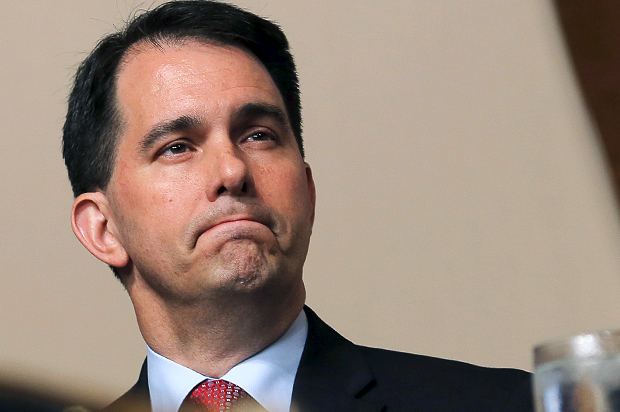The ongoing war against the Islamic State and the newly unveiled multilateral diplomatic agreement with Iran have, for the time being, turned the 2016 presidential race into a big foreign policy debate. For someone like Wisconsin Gov. Scott Walker, this presents a challenge: he has no foreign policy experience to speak of, and he’s running in a field with people like Lindsey Graham and Marco Rubio who, while frequently wrong themselves, at least know which words to use to sound like they know what they’re talking about.
Walker’s initial strategy when dealing with foreign policy questions was to fall back on what he knows. He tried reassuring voters that he’d be able to handle the Islamic State because he successfully weathered union protests in Wisconsin. He said the most significant policy decision of his lifetime – which has encompassed the Vietnam War, the thaw with China, the collapse of the Soviet Union, and several wars in the Middle East – was Ronald Reagan’s firing of air traffic controllers in 1981. He sounded very much like he had no idea what he was talking about.
Since then he’s become a bit more polished and figured out that you can trick people into thinking you have a coherent foreign policy if you just talk about “leadership” and string together a few clichés about American military power. That brings us to the governor’s interview with the Washington Examiner, in which he laid out the Walker Doctrine:
“In terms of the use of force, there has to be a high standard,” Walker told the Examiner. “I think there should be a high bar, and it shouldn’t be about nation-building or being the world’s policeman. It should be about protecting our national security interests.”
Walker said threats to the “American homeland,” or to allies or to “areas where Americans trade or travel” would be among his criteria for determining whether the military should take “force-specific” action.
“I think that military is appropriate to use when we’ve had a threat abroad from radical Islamic terrorism or other terrorism-related threats,” Walker added. “We need to act to take that out before they encroach on American soil.”
He’s not making a ton of sense here. He says there should be a “high standard” for the use of force, and defines that standard as a threat to any American interest anywhere in the globe, and also stuff that isn’t quite a threat but could be a threat at some point. “We need to act to take that out before they encroach on American soil” is a long way of saying “preemptive war.”
But this “high standard” stuff is designed to make Walker seem like he’s a relative moderate in the Republican field when it comes to foreign policy. “Walker steered a middle ground between the consistently hawkish stance of other candidates, such as Sen. Lindsey Graham, and the more anti-interventionist Sen. Rand Paul,” the Examiner writes. That’s a plausible interpretation of Walker’s foreign policy vision only if you disregard all the absurdly bellicose rhetoric he’s deployed in trying to make himself out to be a foreign policy tough guy.
Back in February, Walker was pinned down by ABC’s Martha Raddatz on how he would prosecute the war against ISIS and other terrorist groups, and his response was to just say over and over that he’d be super “aggressive” in doing everything. “I think we need to have an aggressive strategy anywhere around the world,” Walker declared. “I think anywhere and everywhere, we have to be – go beyond just aggressive air strikes. We have to look at other surgical methods. And ultimately, we have to be prepared to put boots on the ground if that’s what it takes.” Just a few days ago he said that “the United States needs a foreign policy that puts steel in the face of our enemies.” And, of course, in talking about how he’d back out of the Iran deal, Walker said that he’d be ready to fight a war on literally the first day of his presidency.
When Scott Walker brings up foreign policy, pretty much all he talks about is bombs and “boots on the ground.” At the same time, he denigrates diplomatic outreach as weak and dangerous. In that way he’s no different from the many other Republican candidates for president who have a dangerous, unjustified, and unshakeable faith in America’s ability to bend the world to our will through the use of military force.

